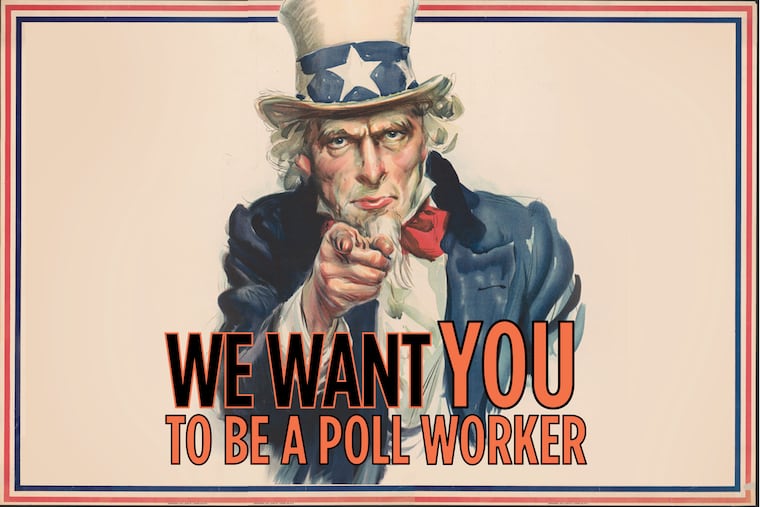FAQ: Want to be a poll worker for the 2020 election? Here’s what you need to know.
Most important to know: It's not too late for you to sign up.

Successfully holding an election on Nov. 3 will require the help of thousands of individuals across the region and state to serve as poll workers. These public servants are the unsung heroes of election days, and many have been staffing the polls for years, if not decades, but recruiting them has become increasingly difficult for election directors. And this year, health concerns from COVID-19 have spiked the number of vacancies that need to be filled in the coming weeks. Here’s what you should know before signing up. (Spoiler alert: It’s definitely not too late to sign up to work the polls on Election Day this year.)
What’s a poll worker?
Poll workers are the front-line workers in our elections — the people you see at your local polling place who check in voters, operate the voting machines, and help address voters’ questions and concerns on Election Day. Typically, each election precinct is overseen by five poll workers: a judge of elections, the majority and minority inspectors, a clerk, and a machine inspector. Philadelphia is planning to fully staff all 1,703 precincts grouped within more than 700 polling places for the general election, meaning upward of 8,500 people will be needed in neighborhoods across the city.
What do poll workers do?
With polls open between 7 a.m. and 8 p.m., poll workers are the first to arrive and the last to leave, which on Nov. 3 could be well after 8 in some locations if there are lines of voters waiting to cast ballots. Preparation involves attending training (offered online and in-person in Philly) and studying materials ahead of Election Day. A poll worker’s duties can differ depending on the position, but several will be greeting voters at a check-in table with lists of registered voters in the precinct, while others will be providing instructions on how to use the voting machine and working to ensure that health precautions are followed.
How do I know if I’m qualified?
The judge of elections and the inspectors are elected positions and can serve only within their own election precinct. However, county election officials always have to fill vacancies, a task that’s become far more challenging during the pandemic. To be appointed to fill a vacancy by your county, you only have to be a registered voter within the county. (Note: Government officials are not allowed to serve as poll workers.)
Do I get paid?
Every poll worker in Pennsylvania is paid, with some counties like Philadelphia providing a stipend to attend training. Basepay in Philly was recently increased for the general election to $200 with another $50 for training.
Why do we need poll workers?
In addition to just making election days possible, poll workers are critically important to ensure that no registered voter slips through the cracks. Poll workers know what to do if someone’s name can’t be found in the poll book, or if they’ve decided to vote at the polls instead of returning their mail ballot. In this election, thousands of voters will be seeing our new voting machines for the first time, many requiring additional instruction to cast their ballot successfully. There are numerous instances where even a little confusion or missing piece of information can make or break someone’s franchise.
What makes this election different?
Poll workers will be all the more essential on Nov. 3, not only to make sure every registered voter can cast a ballot, but to keep everyone at the polls safe. Personal protective equipment (PPE) is expected to be available, but poll workers will have the added duty of ensuring that social distancing and other precautions are followed, and in accommodating hundreds of voters under what will assuredly be stressful conditions.
How can I learn more and sign up to be a poll worker in Philadelphia?
Thousands of new poll workers will be needed in Philadelphia and across the region to serve as poll workers this fall. The Committee of Seventy and the Voter Project encourage interested individuals to sign up online to learn more about the work and receive additional training before being directed to county election offices for possible appointment. Not every applicant will be utilized in a given county, but other volunteer opportunities and ways to support the election will be flagged. The Poll Worker Caucus Facebook group is also open to current and prospective poll workers to raise questions, and exchange ideas and resources ahead of the election.
What if I live in New Jersey or a Philly suburb and want to volunteer?
Anyone interested in Southeastern Pennsylvania (and registered to vote) should sign up with the Committee of Seventy and the Voter Project. People in Delaware or New Jersey can go to Power the Polls, a national effort to recruit poll workers in 2020.
Pat Christmas is the policy director for the Committee of Seventy, a nonpartisan advocate for better government in Philadelphia and Pennsylvania.